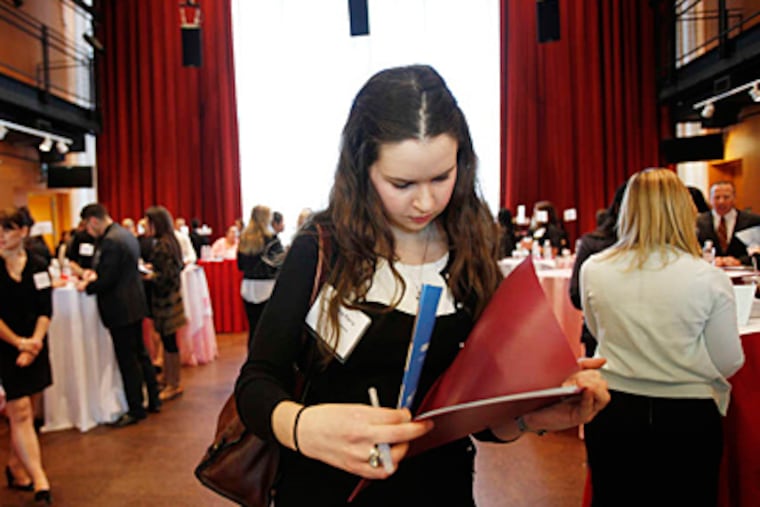Wanted: Talented, driven, works for free
Design-development assistance, press-release writing, pattern-making, phone-answering, even studio-cleaning. A minimum of a bachelor's degree is required for this internship at the Flotsam+Jetsam Design Studio in Fishtown.

Design-development assistance, press-release writing, pattern-making, phone-answering, even studio-cleaning. A minimum of a bachelor's degree is required for this internship at the Flotsam+Jetsam Design Studio in Fishtown.
"An organized individual is essential. Efficient sewing ability is required," the posting on Craigslist said. "There will be a sewing test during the interview."
Compensation: "Non-pay."
At a Center City law practice, there's no coffee-fetching for the qualifying intern. Instead, he or she will "do a fair amount of correspondence preparation, file management and . . . hands-on experience drafting and filing pleadings, performing legal research and interviewing clients."
Being sought is a "git-er-done" person who will handle "a wide range of administrative, secretarial tasks" with knowledge of QuickBooks, website editing, Internet marketing, and Twitter a plus.
"This internship is unpaid," said the recent posting from the Joseph S. Mitchell 3d law firm. "A $150 per/month stipend will be provided to cover travel."
What is an unpaid internship, exactly? Is it out-and-out exploitation, or a beneficial opportunity to work closely with mentors in one's future field of endeavor?
True, there's no money - not even the $7.25-an-hour minimum wage - but the compensation may be a bright spot on a resumé, with access to real-world knowledge and useful contacts.
In some cases, internships satisfy college course or graduation requirements.
The question has become a hot one.
In December, TV host Charlie Rose and his production company agreed to pay up to $250,000 to settle a 2007 wage-and-hour lawsuit brought by an unpaid intern.
During Fashion Week in New York earlier this month, an Occupy Wall Street offshoot distributed "swag bags" containing reminders to "pay your intern" instead of the standard chichi loot.
On Feb. 15, an unpaid intern at Elite Model Management Corp. filed a proposed class-action federal lawsuit against the New York modeling agency. Potential damages could reach $50 million.
That same day, lawyers representing Eric Glatt, 43, an unpaid intern-turned-law student, filed a motion for summary judgment in his case against the production company that made the ballet movie Black Swan.
"Interns weren't there as students," said Glatt, one of at least a dozen on the set. "They weren't there to learn, they were there to do. I did all the activities that a paid clerk would do."
Despite the recent flurry of litigation and news reports, "we really don't get a lot of complaints," said Brian Johnson, area director for the U.S. Department of Labor's Wage and Hour Division. "Even where you know you should be getting paid, there's a hesitancy to file a complaint.
"They may be relying on the company to provide the reference, and usually they are interning in the industry that they'd like to work in," Johnson said. "The last thing they want to do is file a complaint."
Mitchell, the Center City lawyer offering a $150 monthly stipend for nearly 100 hours of work a month, defends his program, saying, "I just give them a lot of value. They really learn. My interns feel the bargain is fair."
Working with the staff of three, including Mitchell, are three or four part-time interns, he said.
Meltem Birey, founder of Flotsam+Jetsam, said her unpaid interns thank her.
"I make sure they leave with something very useful for their future," she said. "If I was in a position to pay, I would have no problem paying."
Federal law allows some unpaid internships, said lawyer Gina Ameci, a partner with Buchanan Ingersoll and Rooney P.C. in Philadelphia.
Governments and some nonprofits can use unpaid internships, she said. For-profit companies must meet a six-point test that emphasizes training. (The Inquirer's publisher, Interstate General Media Inc., has unpaid interns.)
"The intern does not displace regular employees," says the U.S. Department of Labor fact sheet explaining the rules. "The employer that provides the training derives no immediate advantage from the activities of the intern."
Ross Perlin, author of the book Intern Nation: How to Earn Nothing and Learn Little in the Brave New Economy, said, "There is almost an internship hierarchy. You have to have a lesser internship to get a better one, let alone get a part-time job."
Nearly half of all students surveyed by the National Association of Colleges and Employers in Bethlehem said they have had unpaid internships.
Edwin Koc, the group's chief researcher, said paid internships correlate strongly with future job offers, but unpaid ones do not. Koc said he's not sure why.
At a recent Philadelphia University career fair, many students said they'd be willing, reluctantly, to accept free internships.
"Anyone would prefer a paid internship," said Jessica Stevenson, a fashion-merchandising major. "If an unpaid, interesting internship can offer the learning experience, and it gets you to your goal, it's definitely worth it."
Perlin said unpaid internships have societal implications: If interns do the work of entry-level employees, there won't be paid jobs for new grads, exacerbating their employment struggles.
Unpaid internships also perpetuate a system in which students whose parents can support them while they work for free get ahead, while those who have to get jobs to pay tuition fall behind.
Temple University journalism major Rosella Eleanor LaFevre is on her third unpaid internship - this one required for graduation in May. One duty is data entry - not exactly her idea of journalism.
"They're trying to make it look cool by giving us pizza and beer," she said.
"Unpaid internships are great for freshmen," she said. "But now I have an apartment. I can't afford to not get paid."